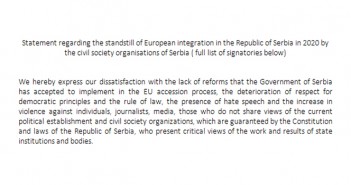CHAPTER 23 – JUDICIARY AND FUNDAMENTAL RIGHTS

The National Convention on the European Union Working Group for Chapter 23 alarms the public that only 36 hours after the end of the public debate, the Government of the Republic of Serbia adopted five judicial laws proposals that had entered the parliamentary procedure on January 17, 2023. It has raised the question of the meaning of the public debate, the purpose of 5 meetings held with the expert public, as well as more than 50 attachments with comments submitted to the Ministry of Justice, that were practically impossible to consider within that short period of time.

After the publication of the new EU enlargement methodology last year, numerous commentators stated that its application to Montenegro and Serbia will not dramatically change the current rules. This was confirmed in the proposal of the European Commission, which reached the media in the region last week. Should the Member States decide to endorse the current proposals, the interim rule of law benchmarks will become a category with an even greater weight in the future, which is notable, but hardly surprising.

We hereby express our dissatisfaction with the lack of reforms that the Government of Serbia has accepted to implement in…

On June 5th, 2020, the Ministry of Justice of the Republic of Serbia informed the Working Group of the National Convention on the European Union for Chapter 23 on completing the consultative process regarding the amendment of the Action Plan for Chapter 23. The Report on Public Consultations with NCEU, which refers to the second round of consultation, was submitted to the Working Group, and at the request of the group, the latest version of the Action Plan for Chapter 23 also. As the Ministry stated, the Action Plan has been addressed to the state authorities for the opinion within the procedure for adoption.

Under the General EU Position for the accession negotiations with Serbia (the “Negotiation Framework”), the Commission is requested to keep the Council duly informed on the state of advancement of negotiations under the chapters “Judiciary and fundamental rights” (Chapter 23) and “Justice, freedom and security” (Chapter 24), and to report to the Council twice a year. Since the opening of accession negotiations in July 2016, and following the presentation of the annual report for Serbia in November 2016, this report is the second semi-annual stock taking moment.

Nacionalni konvent o Evropskoj uniji i predstavnici i predstavnice naučne zajednice i građanskog društva pozivaju Ministarstvo odbrane Republike Srbije da povuče iz procedure usvajanja Predlog Uredbe o oblastima naučnih i drugih istraživanja značajnih za odbranu zemlje i o postupku i uslovima za izdavanje odobrenja za vršenje tih istraživanja zajedno sa stranim licima ili za potrebe stranih lica.

“There is a shrinking space for the debate about human rights and fundamental freedoms in Serbian society. Also, there is less and less public scrutiny of the Government that has a negative effect on the human rights situation in Serbia.”

The review of the Republic of Serbia at the United Nations Human Rights Committee is taking place in a tense political climate in Serbia, and after years of continued deterioration of rights to freedom of expression, in particular media rights, and restrictions to the possibility to participate to public life in general. Previous three years in Serbia have been marked by an evermore growing decay of institutions and the rule of law.




